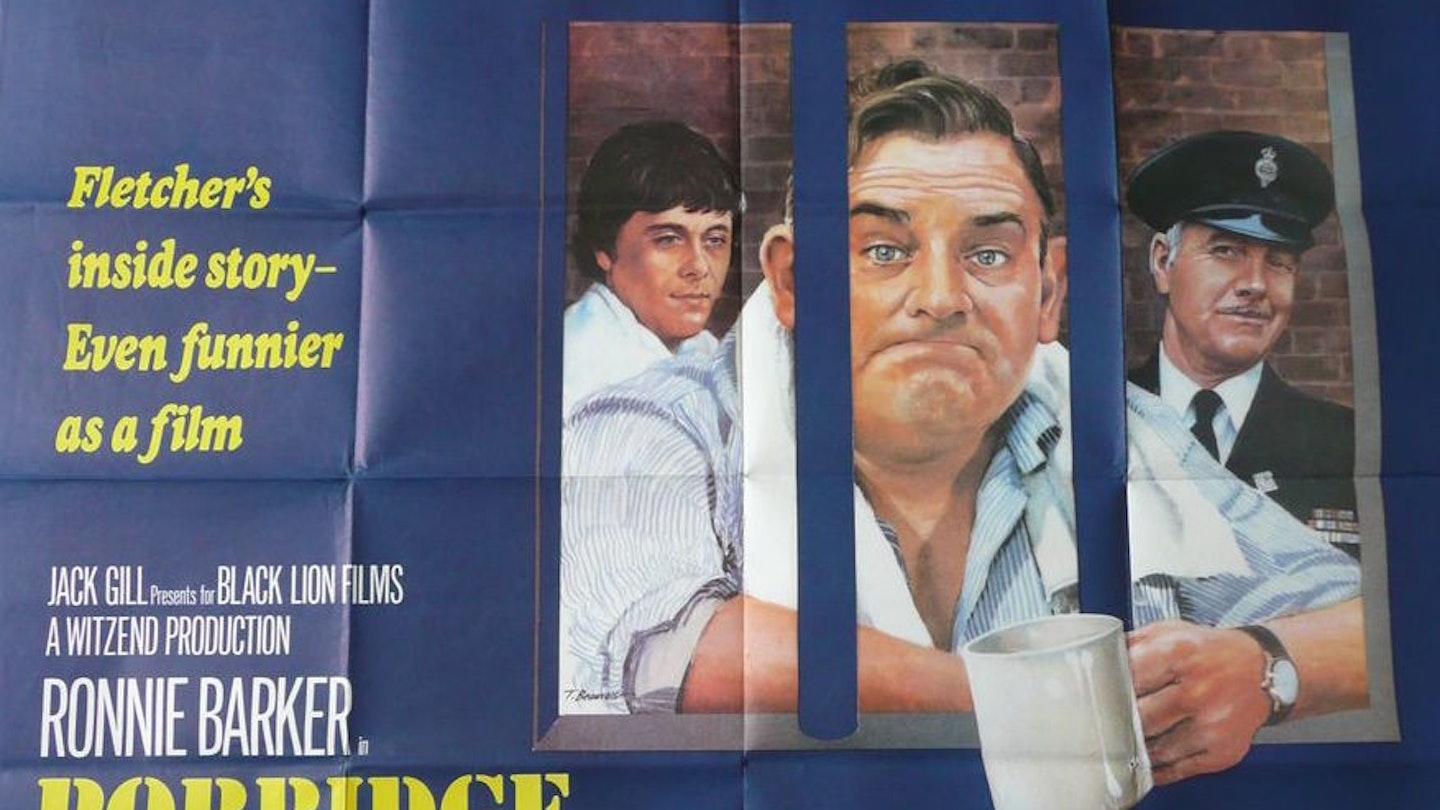So far we’ve had a new Dad’s Army movie this year – a sit-com already adapted to film with its original cast back in 1971. Now, with a new Absolutely Fabulous arriving in feature-length form, here’s a whistle-stop tour through some other British TV perennials (some classic; some not so much) that have made the leap from the small to the big screen.
Till Death Us Do Part (1968)
Dyed-in-the-wool reactionary bigot Alf Garnett – the monstrous creation of Warren Mitchell and writer Johnny Speight – raged on the BBC for seven series of Till Death Us Do Part and six of follow-up In Sickness And In Health. This film comes early in his long run, and serves as a prequel: half set during WWII, and half in 1966. We pick up Alf and his wife Else as newlyweds during the Blitz, follow the birth of their daughter Rita, and then slip ahead to the pivotal election year and, of course, England’s World Cup win. 1972 sequel The Alf Garnett Saga picked up where the first film left off, with Alf and Else adapting to life in a high-rise council flat, following their original Wapping home’s demolition.
A modern version of this would be topical. Alf would definitely have voted for Brexit.
On the Buses (1971)
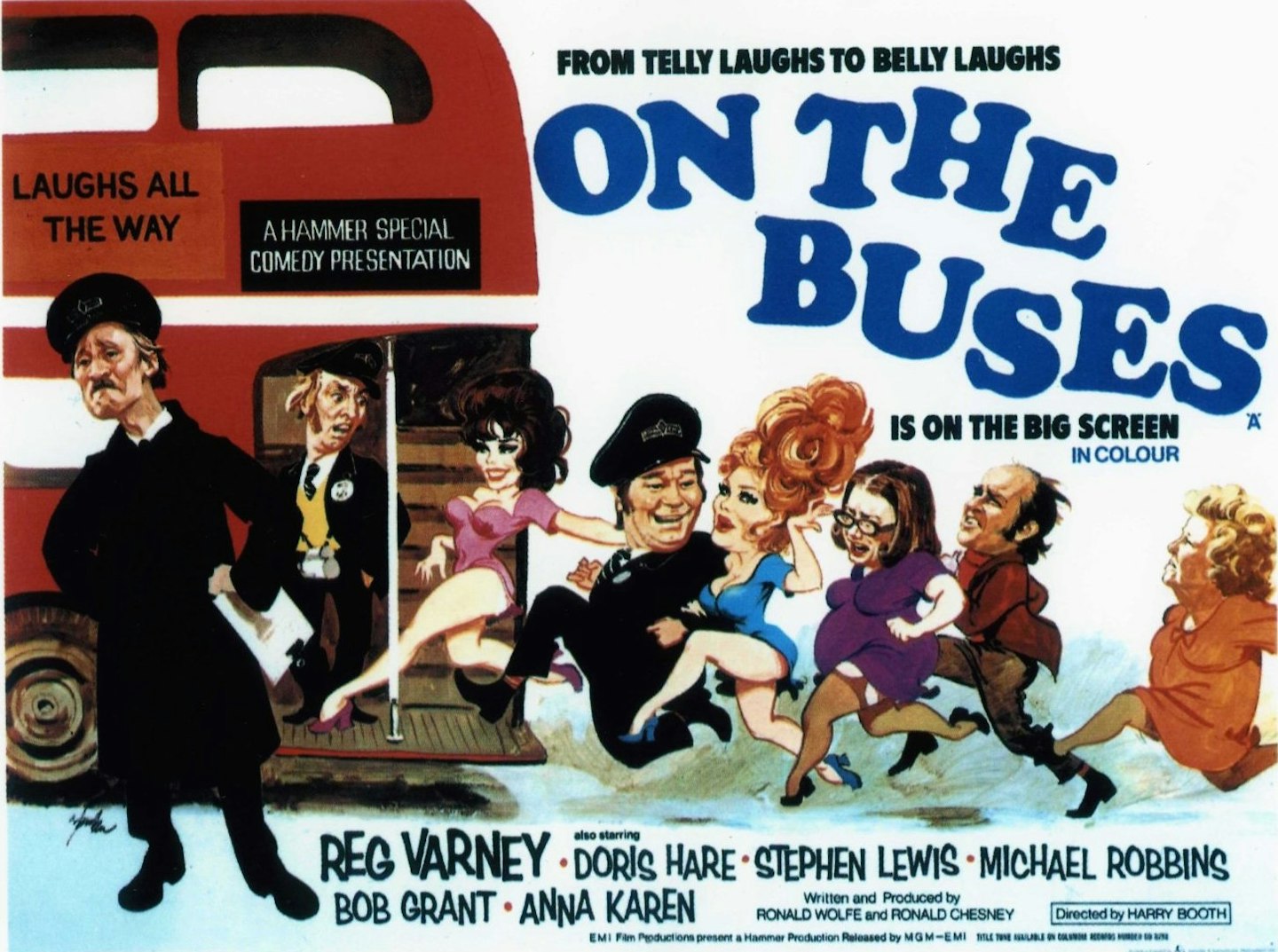
Hammer weren’t just about horror. They got into the sit-com-to-film business early, turning National Service chortlefest The Army Game into I Only Arsked in 1958. They then got into a lucrative niche with their gothic business, but as the popularity of Frankenstein monsters and lesbian vampires waned, On The Buses was among their great successes of the ‘70s. The ITV sitcom was about the bus depot misadventures and skirt chasing of Stan (Reg Varney) and Jack (Bob Grant), and their battles with grim Inspector “Blakey” Blake (Stephen Lewis). The first film saw them facing the threat of –shock! Horror! – female bus drivers. Sequel Mutiny On the Buses (1972) involved various slapstick disputes over uniforms, radio equipment, safety procedures and wages. And final gasp Holiday On The Buses (1973), packed everyone off to Pontins for yet more leery japes in a different setting.
Up Pompeii! (1971)
45 years before Deadpool, Frankie Howerd was breaking the fourth wall as the lascivious Lurcio (slave to his master Ludicrus Sextus), attempting to narrate a story but never getting further than “The Prologue” as cheeky farce collapsed around him. Carry On veteran Talbot Rothwell wrote the double-entendre heavy scripts. Freed of TV restrictions, the film was a more explicit sex comedy (in that there was actual on-screen nudity) but basically more of the same, with the mayhem hung on a plot about retrieving a politically dangerous scroll. Sequel Up The Chastity Belt (released the same year) followed the same format, but changed the setting to Robin Hood’s merrie England (Howerd was now a peasant called Lurkalot). And there was one more, in the form of Up The Front, which sent Howerd’s Private Lurk off to the First World War.
Bless This House (1972)
A vehicle for Sid James, ITV’s Bless This House revolved around the Abbot family. James (playing a character called Sid, of course) was the out-of-touch paterfamilias struggling to comprehend his kids, and enduring neighbourly battles with Terry Scott and June Whitfield next door. The film was basically that again, with minor tweaks to the extended cast. Sid is trying to build an illegal whiskey still, but suffers constant distractions from his youngsters and his new neighbours Terry and June. The Carry On team produced it, seizing the opportunity for more _hyuk hyuk hyuk_s.
Steptoe and Son (1972)
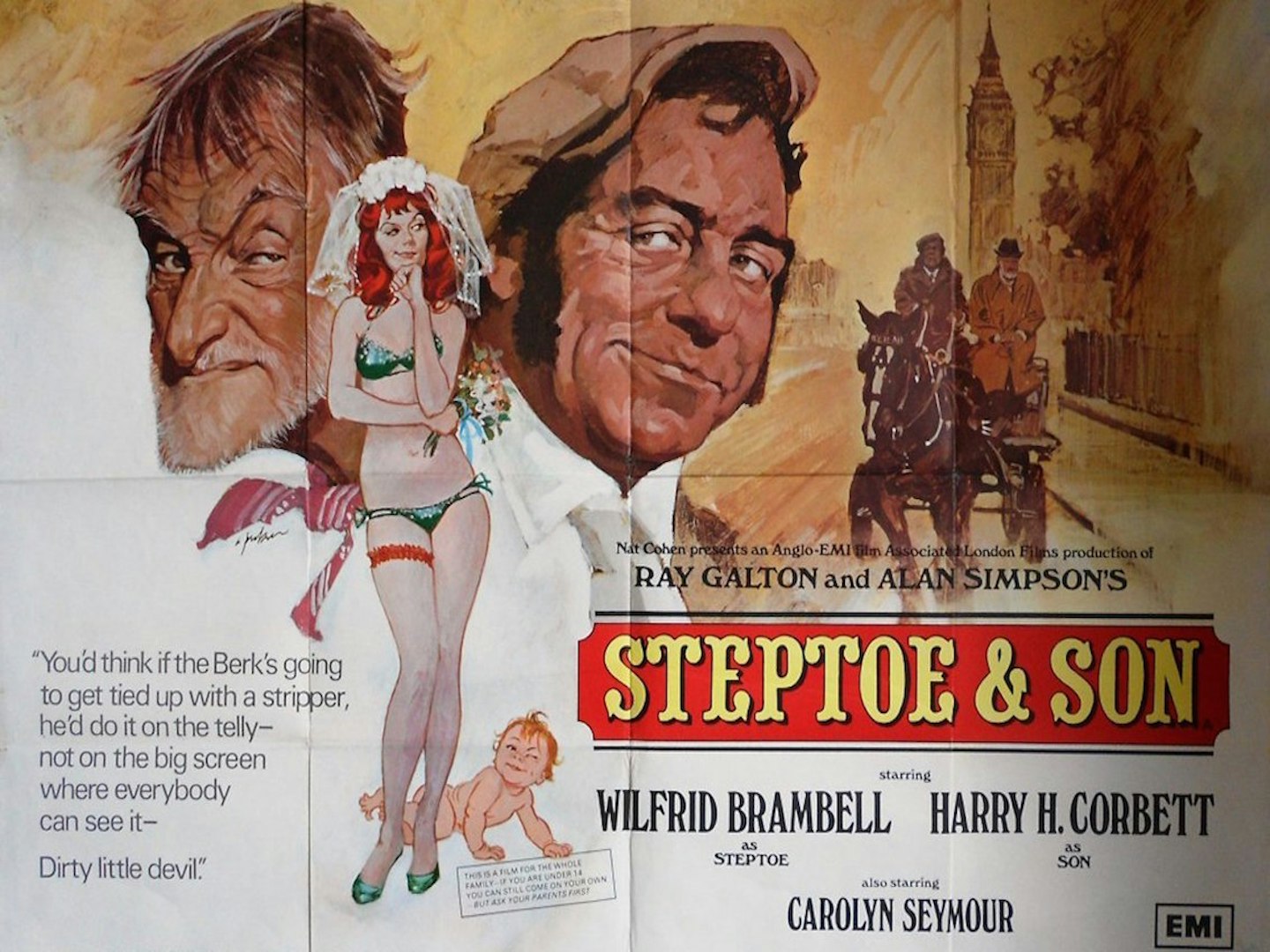
There were eight series of Steptoe And Son in the ‘60s and ‘70s: an often bleak comedy about father and son rag-and-bone men (Wilfred Brambell’s Albert and Harry H. Corbett’s Harold) stuck together in their decrepit yard. The first film arrived late in the run, offering Harold an escape when he marries a local stripper called Zita, briefly honeymoons in Spain and – he’s told – fathers a child. But Albert, of course, throws a manipulative spanner in the works; it turns out the baby isn’t Harold’s; and Zita leaves him for a musician in her backing band (having already cheated on him with a Spanish holiday rep). Poor Harold ends the film back where he started. Sequel Steptoe And Son Ride Again happened the following year, involving gangsters, gambling debts, and Albert faking his own death to claim some life insurance. Which doesn’t work, obviously.
Man About the House (1974)
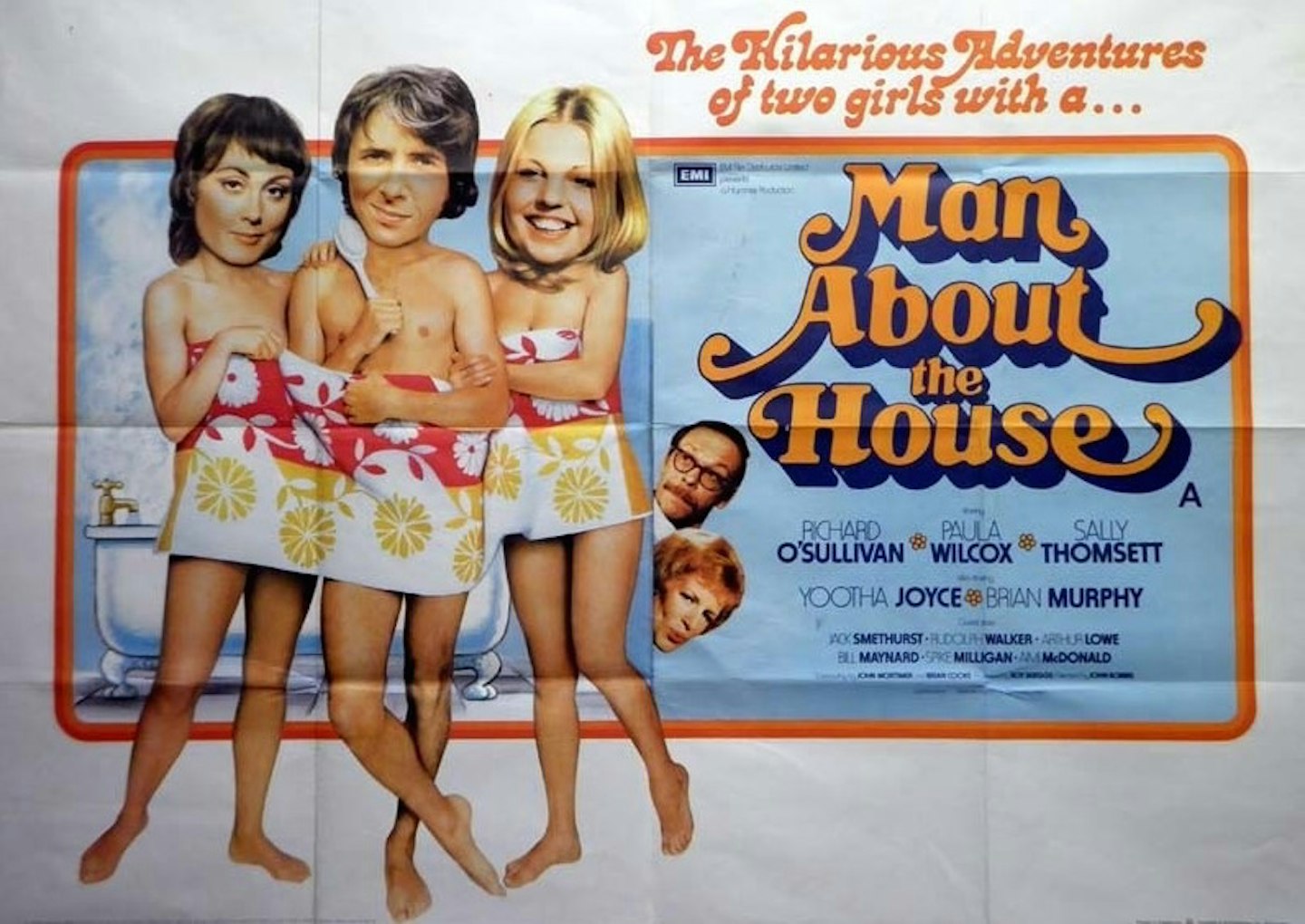
The set-up of Man About The House was Richard O’Sullivan sharing a flat with hot chicks Paula Wilcox and Sally Thomsett (incredibly a controversial premise at the time). The platonic threesome continually butt heads with landlords George and Mildred Roper (Brian Murphya and Yootha Joice) who find the mixed-sex arrangement freakish. The film sees them joining forces against a shady developer who wants to buy the building. This was Hammer’s final sit-com movie. MATH spin-off series George And Mildred got its own movie in 1980, from a different studio.
The Likely Lads (1976)
The Likely Lads was the Men Behaving Badly or Inbetweeners of the ‘60s, with childhood friends Terry and Bob (James Bolam and Rodney Bewes) negotiating early adulthood and the pursuit of girls. In the ‘70s it was revived as Whatever Happened To The Likely Lads?, picking up with the pair a few years later, when Terry has just come out of the army and Bob has settled down to an aspirational middle-class life with Thelma (Brigit Forsyth). The film came after the TV run had ended, reverting to the original title but continuing on from the Whatever series. Terry is now dating Christina (Mary Tamm), and the pair embark on a caravan holiday with Bob and Thelma that goes so disastrously that both couples separate. Bob and Terry then head off for a weekend in Whitley Bay, where farcical hi-jinks ensue with a predatory boarding house landlady and her daughter.
Are You Being Served? (1977)
Are You Being Served? was set in the Grace Brothers department store, but with the shop undergoing a refit, the film jets the cast off to Spain (actually an island off Spain, the “Costa Plonka”) for a paid holiday. Mrs Slocombe doesn’t bring her pussy. Someone must be taking care of it at home. The hotel isn’t ready; there’s some business with love notes, tent swapping, an inflatable bra and a toilet with locks on the outside; and then there’s a revolutionary uprising and a gunfight with federal troops. This was actually an adaptation of a stage spin-off that the cast performed for a season in Blackpool.
Porridge (1979)
One of the best examples of the sit-com spin-off, the Porridge movie quite cleverly tweaks the prison-based format of the series and expands for the big screen by taking the action outside the gates. Fletcher (Ronnie Barker) and co. are involved in a football match which is providing the ideal cover for another inmate’s escape plan. The problem is, Fletcher and Godber (Richard Beckinsale) don’t want to escape, since it would scotch their chances for imminent parole. Reluctantly caught up in the breakout, they have to somehow get back into Slade Prison before anyone notices they’ve gone. This was made two years after the series finished, but is obviously set sometime before the final episode.
Rising Damp (1980)
Essentially a greatest-hits of the TV series about seedy landlord Rigsby (Leonard Rossiter) and his tenants. Rigsby loves Miss Jones (Francis de la Tour); Miss Jones fancies Philip (Don Warrington); Philip amuses himself by exploiting Rigsby’s ignorant racism and pretending to be the son of an African chief. And so on. Several of the film’s specific incidents had already been seen in the TV series and were simply recycled for the big screen version. It was made after the TV run had ended, by which time Richard Beckinsale had sadly died. Christopher Strauli – at the time starring in writer Eric Chappell’s next sit-com, the hospital-set Only When I Laugh – took his place.
Bottom (1999)
Guest House Paradiso isn’t exactly a film of Bottom – but it’s Ade Edmondson and Rik Mayall playing characters called Eddie and Richie, who hate each other and fight a lot. So it’s as near as dammit. Edmondson directed the movie, which has him and Rik running a useless hotel next to a leaking nuclear power station. It’s really a loose connection of sketches about the boys dealing terribly with the hotel guests (Bill Nighy and Simon Pegg among them), but there’s some semblance of a plot about a mysterious Italian beauty (Hélène Mahieu as “Gina Carbonara”) on the run from violent gangster boyfriend Gino Bolognese (played by Vincent Cassel!). Everyone gets violently ill from eating radioactive fish, and the climax involves a lot of projectile puking and a vomit-boulder sequence aping Raiders Of The Lost Ark.
The League of Gentlemen (2005)
The big-screen League Of Gentlemen’s Apocalypse sees Mark Gatiss, Jeremy Dyson and Steve Pemberton playing themselves as well as their regular cast of characters from the dark TV show. Fourth gentleman Jeremy Dyson, who writes but doesn’t act, is played by Michael Sheen. The meta business at hand involves a dimensional door through which the League’s fictional world encroaches on our own. Chaos reigns.
The Thick of It (2009)
In The Loop both is and isn’t a film of The Thick Of It: it shares the characters Malcolm Tucker (Peter Capaldi) and Jamie McDonald (Paul Higgins), but all the other regular cast members play different characters, and there are plenty of new characters who aren’t in the show. The movie centres on Anglo-American politics, with the British and American governments facing a potential new war in the Middle East. Taking The Thick Of It’s approach but moving much of the acerbic drama to the White House, it anticipates writer/director Armando Iannucci’s subsequent American series Veep.
The Inbetweeners (2011)
E4’s Inbetweeners TV series followed four teenagers (Simon Bird, Joe Thomas, Blake Harrison and James Buckley) in their final years at school. The film picks them up post-A Levels and, in time honoured, TV-to-film tradition, takes them out of their established setting and packs them off on holiday – in this case to Crete. Bad behaviour and issues with girls are, of course, the result. The Inbetweeners 2 followed three years later, with the maturing pals (in age if not demeanour) growing apart but reuniting for another vacation, this time in Australia.
Bad Education (2015)
Another school-based sit-com (this time from BBC3), and another one that uproots its cast to see how they cope somewhere else (see above, plus the Please Sir! film from 1971). The Bad Education Movie starts in Amsterdam with some inappropriateness in the Anne Frank museum. Later on it decamps to Cornwall, with world’s worst teacher Jack Whitehall attempting to corral his charges as they get mistaken for a terrorist sleeper cell and mixed up in a "Cornish Liberation Army" struggle for independence. Iain Glen plays the bad guy. Magic mushrooms and desiccated foreskins are consumed.
Honourable mentions:
Spaced (2004)
Not a film of Spaced, but you'd complain if we didn't include it. Zom-com Shaun Of The Dead stars, of course, Simon Pegg and Nick Frost, and Edgar Wright directed. But while the team's the same - and the film has roots in a sequence in a Spaced episode, the characters are different and there's no other connection (edit: Edgar Wright reminds us that Tyres does actually shuffle by!). Hot Fuzz and The World's End make up the rest of the Cornetto Trilogy.
Last Of The Summer Wine (1983)
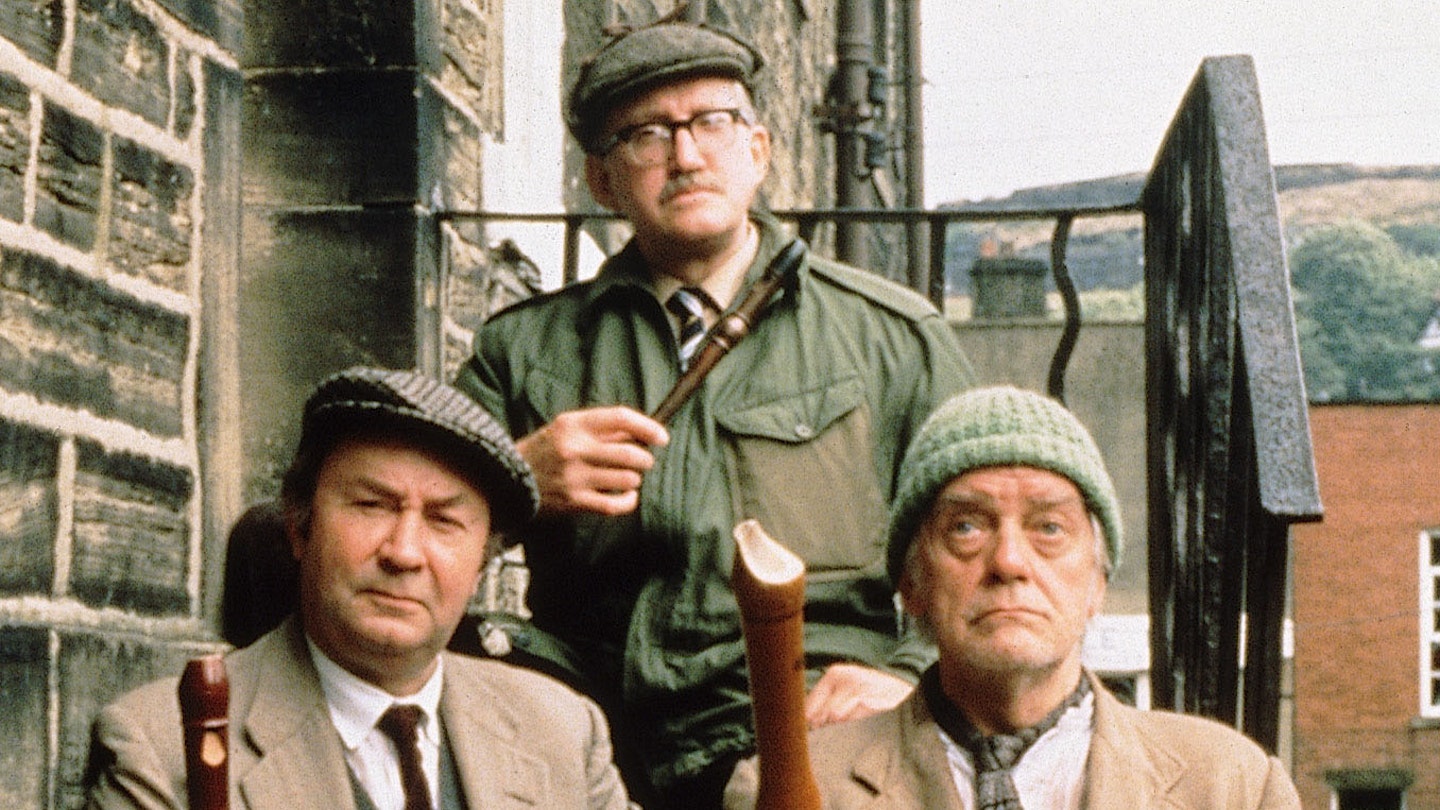
Not made for the cinema, Getting Sam Home was a Christmas special for the venerable sit-com: a TV-movie shot on film, running for 90 minutes and not encumbered by an audience laugh track. You’ll know Summer Wine as that gently cosy show about pratfalling old men, but the film reflects an era when the characters were younger (possibly even unemployed rather than retired) and the series had slightly more edge. Adapted from a tie-in novel by series writer Roy Clark, the film’s plot centres on the body of Sam, who has died in the bed of local floozy Lilly. To prevent Sam’s wife learning that he popped his clogs in flagrante elsewhere, Compo (Bill Owen), Clegg (Peter Sallis) and Foggy (Brian Wilde) hatch a haphazard plan – at one point involving an almost derelict pink double-decker bus converted into a chip van - to get his corpse home undetected.
